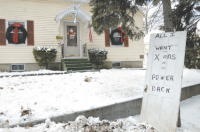Seven years after ice storm, Unitil court fight rages on
By Rebecca Leonard, rleonard@sentinelandenterprise.com
12/13/2015
FITCHBURG -- Seven years after a devastating ice storm left many residents without power or heat for up to two weeks, memories of the event's damage remain vivid.
After the storm, residents of Fitchburg, Ashby, Lunenburg and Townsend were enraged by the service provided by Unitil Corp., the parent company of Fitchburg Gas & Electric Light Co., and filed a class-action lawsuit against the utility.

Erik Jarvi cuts fallen tree branches in front of his home at 217 Oak Hill Road in Fitchburg after the December 2008 ice storm.
"It's about their gross failures that resulted in people being without power for two weeks " said Cathy Clark, a Lunenburg resident who has been organizing against the company since the ice storm with a group known as Get Rid of Unitil.

Seven years ago, this was the scene on Mechanic Street in Fitchburg, as a devastating ice storm knocked out power for up to two weeks.
After receiving calls from Unitil customers complaining about poor service from the company -- ranging in severity from a loss of groceries to lost wages and damage to their homes -- then-Attorney General Martha Coakley's office launched an investigation of Unitil and other utility companies in the area.
Coakley's report found the company "reflected a lack of investment in modern Outage Management Systems, a lack of accurate and timely communications with its customers... and an inability to properly organize the massive influx of assistance required to accomplish a reasonably timed restoration."
Alec O'Meara, media relations manager for Hampton, N.H.-based Unitil, said since the storm the company's philosophy is "one of continuous improvement."
"After each one (of the weather events after the ice storm) we have implemented new things and further refined our emergency response plan," said O'Meara.
Clark said she heard at the end of July the lawsuit was certified to proceed into Superior Court.
A judge must certify class-action lawsuits to show that the plaintiffs are a class with similar grievances and that it is impractical for them to sue individually.
"It has been many years, but it does represent some justice with specific regard to (the failures)," said Clark.

Christmas wishes at 197 Rollstone St. in Fitchburg were drastically simplified after the ice storm.
But it hasn't been easy for the lawsuit to get to this point.
In 2009, 12 residential and business customers filed the suit to seek damages from Unitil for "failing to spend sufficient sums of money to adequately maintain and manage its systems, have an adequate vegetation and/or tree cutting program and properly respond to a serious storm and resulting power outage."
According to Unitil's appeal, filed Nov. 10, 2009, the suit was denied, as were several more attempts to seek damages.
O'Meara said the company's most recent appeal, against certification of the suit, has been approved to be heard by the state Supreme Judicial Court.

Trees lie strewn across Rindge Road leading to Fitchburg State University.Sentinel and Enterprise staff photos can be ordered by visiting our SmugMug site.
According to Clark, Unitil attempted to change the language of part of the lawsuit, which said they could be "removed from the service territory," which the judge denied.
Clark said the next session for the suit is scheduled for the first week of February.
"People have lost faith," said Clark, "but they shouldn't lose faith in this court case."
The frustration of Unitil's customers has sparked new support for a bill first filed 14 years ago that would allow a community to form a municipal electric utility. The bill, dubbed the Muni-Choice Bill, has been introduced in the Statehouse eight times and died seven times, according to the Massachusetts Alliance for Municipal Electric Choice website.
However, according to the website, Fitchburg state Rep. Stephen DiNatale "led 18 state legislators in refiling the Muni Choice Bill for the eighth time for the 2015-16 legislative session."
According to Patrick Mehr of the Massachusetts Alliance, the bill was before the Joint Telecommunications, Utilities and Energy Committee in October, but he hasn't been contacted about where it stands now.
The Muni Choice Bill would change the current law governing energy infrastructure, which binds communities into a monopoly of utility services, according to Mehr.
Fitchburg City Councilors Stephan Hay and Dean Tran, who have both declared themselves as candidates for the state representative seat being vacated by DiNatale after he is sworn in as mayor, said they support the bill.
According to Hay, the state needs to help find alternatives to the city's energy suppliers.
Tran said, he "wholeheartedly supports the bill" and said the last time a community developed a municipal electric utility was in 1927.
"This bill would allow communities to have low and reliable rates," said Tran, "and I'm quite happy more representatives have signed on to it."
The state has 41 "munis" serving 15 percent of the Massachusetts population, according to the Massachusetts Alliance for Municipal Electric Choice website.
O'Meara pointed to a Department of Energy Resources municipal utility report conducted in January 2010. The report was meant to gauge if a "muni" was practical in Massachusetts.
According to the report, "it does not draw any broad conclusions on whether municipal utilities are preferred to (investor-owned utilities)" such as Unitil.
O'Meara said municipal utilities that were close to Unitil's service area showed their process "was completed in roughly the same period of time as Unitil," after major storms in the last seven years.
Since the ice storm, residents throughout both the city and the Northeast have done what they can to better prepare in the event of another destructive storm.
Tom St. Pierre, manager of the Aubuchon Hardware in Fitchburg, said the aftereffects of the storm lasted more than a month, even after the power was restored.
St. Pierre said the storm made people "very nervous" and they never wanted to be caught without necessities again.
"We were selling generators as fast as we could get them during the storm," said St. Pierre. "But with that, we were also selling batteries, flashlights, gas cans, even chains and padlocks."
Charlie Aubuchon, vice president of distribution center operations at Westminster-based Aubuchon Hardware, said the amount of generator sales has increased dramatically.
Before 2008, Aubuchon said, the company sold very few generators, but now sales have increased so much that Aubuchon carries a second brand besides Honda to meet demand.
"We've had so many incidents of bad weather since the ice storm," said Aubuchon, "People want to be ready."
Disclosure: Rebecca Leonard works part time for Aubuchon Hardware.
Follow Rebecca Leonard on Twitter @beccanicole1478
